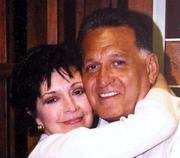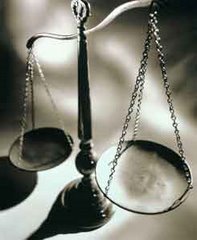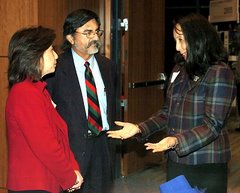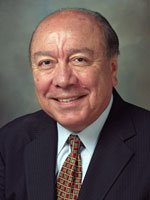State v. James
1. The State's failure to file a brief demonstrates, at the least, a lack of interest and also a lack of confidence in the convictions and sentences obtained. A prosecutor's office should demonstrate its obligation to represent the interests of the public.
2. When the sufficiency of the evidence is challenged, the standard of review is whether, after review of all the evidence, viewed in the light most favorable to the prosecution, the appellate court is convinced that a rational factfinder could have found the defendant guilty beyond a reasonable doubt.
3. The granting of a new trial is a matter which lies within the sound discretion of the trial court, and appellate review of a trial court's decision denying a new trial is limited to whether the trial court abused its discretion.
4. The issue of ineffective assistance of counsel involves mixed questions of fact and law, which are subject to de novo review.
5. The failure of the State to file a brief and contest the allegations and claims of an appellant leaves the court in a position in which it accepts appellant's claims on the issue of ineffective assistance of counsel.
6. An attorney's representation of his or her client requires him or her to explain to the client the reason for and purpose of any stipulations he or she makes. A failure to do so indicates counsel was ineffective.
7. The failure of counsel to investigate and subpoena his or her client's alibi witness can be ineffective assistance of counsel if the client is prejudiced by such failure.
8. As a general rule, the failure to call certain witnesses is a matter of trial strategy. However, defense counsel cannot disregard pursuing a line of investigation and call it "trial strategy."
9. In determining whether counsel was ineffective, the Chamberlain v. State, 236 Kan. 650, 694 P.2d 468 (1985), two-prong test should be applied. The prejudice prong of Strickland requires an appellant to show there is a reasonable probability that, but for counsel's errors, the result would have been different. "Reasonable probability" is defined as a probability sufficient to undermine confidence in the outcome.
Appeal from Jefferson District Court; GARY L. NAFZIGER, judge. Opinion filed May 2, 2003. Reversed and remanded with directions.
Paige A. Nichols, assistant appellate defender, for the appellant.
No appearance by the appellee.
Before RULON, C.J., LEWIS and GREEN, JJ.
LEWIS, J.: Appellant Timothy J. James was convicted of aiding and abetting aggravated burglary, aiding and abetting aggravated robbery, and aiding and abetting aggravated kidnapping. As the result of these convictions, appellant was sentenced to 253 months in prison. Appellant filed a timely motion for a new trial, which was denied by the trial court. This is an appeal of the denial of appellant's motion for a new trial. Appellant contends the evidence was insufficient, he had ineffective assistance of counsel, and the trial court erred in not granting him a new trial upon newly discovered evidence.
We first note that the State has not found it worth its time or effort to file a brief contesting defendant's allegations on appeal. The failure of the State to file a brief plays a significant part in our decision. We have earlier held:
"The State's failure to file a brief demonstrates, at the least, a lack of interest and also a lack of confidence in the convictions and sentences obtained. See Seaton v. State, 27 Kan. App. 2d 104, 105, 998 P.2d 131 (2000); Zapata v. State, 14 Kan. App. 2d 94, 99, 782 P.2d 1251 (1989). The prosecutor's office should demonstrate its obligation to represent the interests of the public." (Emphasis added.) State v. McGrew, 29 Kan. App. 2d 1051, 1055, 36 P.3d 334 (2001).
We construe the State's failure to file a brief in line with the quotation above. In our judgment, the prosecutor's office in this case did not demonstrate its obligation to represent the interests of the public.
The facts on which defendant's charges and conviction were based will be outlined summarily in this opinion.
At the time the crimes were committed, appellant was involved in a contentious divorce with his wife, Diane. As a result of orders in the divorce case, appellant was required to move from his Lawrence home and in with a neighbor across the street. His 17-year-old stepson, Chris James, and Chris' friend, Mike Manis, lived by themselves in the home.
At about the same time, Chris and Manis broke into Judson Smith's trailer in Perry, beat him, tied him up, and stole records, a record player, CD's, CD players, and money. On initial questioning concerning the robbery and assault, Chris and Manis originally took sole responsibility for the acts. At the preliminary hearing, however, Chris decided to tell "the truth" and testified that appellant planned the Smith burglary. Chris testified similarly at appellant's June 2001 jury trial. Manis' testimony changed from the time of appellant's preliminary hearing, when he denied appellant's involvement, to the time of the jury trial, when he accused appellant of being involved.
Ultimately, both Chris and Manis pled guilty to aggravated kidnapping and are serving 101-month terms in prison. As a result of the testimonies of Chris and Manis, appellant was charged with aiding and abetting aggravated burglary, aiding and abetting aggravated robbery, and aiding and abetting aggravated kidnapping.
At his trial, appellant was represented by John Kurth and requested that Kurth contact his divorce attorney, Jim Rumsey, regarding Chris' possible motive in fabricating appellant's involvement in the crimes. Rumsey may have been able to provide information Kurth could have used to impeach both Chris and Manis at appellant's trial. However, Kurth did not even meet with Rumsey until after appellant's convictions.
At trial, appellant denied being involved in the Smith burglary and testified he had no knowledge of the events of that night beforehand.
At trial, Kurth entered stipulations to "eliminate the need for additional testimony regarding the actual crimes" and for the "admissibility of State's [e]xhibits." Appellant had an alleged alibi witness who was never served with a subpoena and did not testify. Kurth offered no evidence of Diane's renewed involvement with Chris, the $150,000 judgment against Diane in favor of appellant, or any evidence from Diane's divorce attorney, who also represented Chris for his crimes. The jury convicted appellant on all counts, and he was sentenced to 253 months in prison, whereas Chris and Manis received 101-month sentences.
After his convictions, a family therapist who had seen appellant throughout the divorce, called Kurth and revealed she had received correspondence from Chris around the time of his plea. Based on Chris' letters, Kurth moved for a new trial. Rumsey then became appellant's defense attorney.
At the hearing on the motion, the letters and additional evidence of Chris' conversation with a cellmate were introduced. Appellant, Krause, Kurth, and Chris' former cellmate testified, all indicating Chris and Manis had admitted that appellant had nothing to do with the crimes. The trial court denied appellant's motion for a new trial, found that his trial counsel was effective, and found that his representation did not prejudice appellant. Further, the court found the alleged newly discovered evidence was not sufficient to grant a new trial. This appeal followed.
SUFFICIENCY OF THE EVIDENCE
James first contends that because the accomplice testimony was so incredible, the evidence was insufficient to sustain the burden of proof. He maintains that no rational factfinder could have found him guilty beyond a reasonable doubt. We disagree.
"When the sufficiency of the evidence is challenged, the standard of review is whether, after review of all the evidence, viewed in the light most favorable to the prosecution, the appellate court is convinced that a rational factfinder could have found the defendant guilty beyond a reasonable doubt. [Citation omitted.]" State v. Lessley, 271 Kan. 780, 785, 26 P.3d 620 (2001).
Both Chris and Manis testified at trial that the three planned for appellant to drop them off at Smith's home. Chris and Manis would await Smith's arrival, put Smith in the trunk of his own car, and steal his bank funds from numerous ATM's. Appellant, of course, denied the testimonies of Chris and Manis and insisted he was not involved in the crimes. The jury apparently agreed with the testimonies of Chris and Manis and did not believe appellant. We conclude the testimonies of Chris and Manis were sufficient to convince a rational factfinder that appellant was guilty as charged.
We do not reweigh the evidence or pass upon the credibility of the witnesses. This is the duty of the finder of facts.
We conclude the convictions were supported by substantial competent evidence.
INEFFECTIVE ASSISTANCE OF COUNSEL
Appellant next argues the trial court erred by denying his motion for a new trial based upon ineffective assistance of trial counsel.
"The granting of a new trial is a matter which lies within the sound discretion of the trial court, and appellate review of a trial court's decision denying a new trial is limited to whether the trial court abused its discretion." State v. Franklin, 264 Kan. 496, 498, 958 P.2d 611 (1998).
"The issue of ineffective assistance of counsel involves mixed questions of fact and law, which are subject to de novo review." State v. Muriithi, 273 Kan. ___, ___, 46 P.3d 1145 (2002).
Appellant argues Kurth was ineffective by: (1) not interviewing Manis or Chris prior to appellant's preliminary hearing; (2) not interviewing Chris at all; (3) not following up on discovery requesting the terms of Chris' and Manis' plea agreements; (4) stipulating to the underlying crimes; (5) not subpoenaing the alleged alibi witness; (6) not preparing appellant before he was allowed to take the stand; (7) spending limited time with appellant in arriving at a viable theory of defense; and (8) not contacting Rumsey, appellant's divorce attorney, regarding possible motives for Chris' testimony.
The trial court applied the Strickland v. Washington, 466 U.S. 668, 80 L. Ed. 2d 674, 104 S. Ct. 2052 (1984), two-prong test and concluded Kurth's performance was not deficient and appellant was not prejudiced at trial by errors so serious as to deprive him of a fair trial.
The State's failure to file a brief and to contest appellant's allegations concerning his attorney leaves us with little choice but to believe that appellant's attorney acted as appellant indicates in his brief. This is one consequence of the State's failure to file a brief with this court or to deny the contents of appellant's brief.
Appellant first points out that Kurth stipulated to the essential elements of the charged offenses. He contends he was never advised of the consequences of the stipulation and that he did not knowingly, voluntarily, and intelligently consent to it.
Kurth testified at the hearing on the motion for a new trial that he did not remember whether he told appellant the purpose of the stipulation. He stated his decision to stipulate to the crimes was strategic. He did not want the victim to testify, and the stipulation prevented the victim from testifying before the jury. Thus, Kurth's reasons for acting may have been one of strategy. In any event, we conclude that Kurth should have advised appellant of the purpose of the stipulation when Kurth testified he did not remember whether he advised appellant. There is nothing in the record to indicate appellant was so advised, and we accept his testimony to that effect.
In State v. Downey, 27 Kan. App. 2d 350, 2 P.3d 191 (2000), the court concluded when criminal defendants agree to stipulated facts without objection, they are precluded from arguing on appeal the stipulated facts were disputed. However, Downey is distinguishable from the case at bar. In Downey, the trial court specifically asked the defendant if he understood the ramifications of agreeing to the stipulation. The record does not show that the trial court in this case so advised appellant; however, the court took a 10-minute recess to discuss the stipulation with counsel and appellant was present.
Appellant next argues his counsel was ineffective for his failure to investigate and present his theory of defense.
Appellant had been residing in the home of his neighbors, the Donahoes, on the date the crimes were committed. He told his attorney that Mr. Donahoe could provide him with an alibi and asked him to speak with Donahoe and subpoena him. Kurth failed to do so, explaining that Donahoe did not want to testify. However, Kurth did not testify or even infer that Donahoe would have been unable to provide the alibi evidence claimed by appellant. This testimony could have been very important in appellant's defense, and it would have impeached the testimonies of Chris and Manis. In our opinion, it may have created the doubt needed to acquit appellant. We consider the failure to call this witness a serious error which prejudiced appellant.
In State v. Thomas, 26 Kan. App. 2d 728, 993 P.2d 1249 (1999), aff'd 270 Kan. 17, 11 P.3d 1171 (2000), this court held trial counsel provided ineffective representation by failing to file notice of alibi when the defendant's sole defense was that he had an alibi.
In State v. Mullins, 30 Kan. App. 2d ___, 46 P.3d 1222 (2002), we stated that although calling witnesses is generally a matter of trial strategy, defense counsel cannot disregard pursuing a line of investigation and call it "trial strategy."
In addition to Kurth's other admissions, appellant testified he repeatedly asked Kurth to contact his divorce attorney, Rumsey, as to possibility theories of defense. Kurth did not do so, and it appears to us that he violated the rule laid down in Mullins. We note that Rumsey spoke at length at the hearing on the motion for a new trial, but he has never testified under oath or signed a sworn affidavit regarding what could have been proffered had Kurth contacted him before appellant's trial. Rumsey called his secretary to testify to the letter received from Manis.
In Strickland v. Washington, 466 U.S. 668, and Chamberlain v. State, 236 Kan. 650, 694 P.2d 468 (1985), it is stated that in determining whether counsel was ineffective, the Strickland two-prong test should be applied. The prejudice prong of Strickland requires an appellant to show there is a reasonable probability that, but for counsel's errors, the result would have been different. "Reasonable probability" is defined "as a probability sufficient to undermine confidence in the outcome." Chamberlain, 236 Kan. at 657.
We conclude that based on the facts we have, appellant was prejudiced by his attorney's failure to contact witnesses, subpoena witnesses, etc. This being the case, we reverse appellant's convictions and remand the case for a new trial consistent with this opinion.
Since we have reversed appellant's convictions based on ineffective assistance of counsel, we will not discuss the other issues raised in appellant's briefs. We will in passing and without further comment indicate that we do not believe the trial court abused its discretion in denying appellant's motion for a new trial based upon newly discovered evidence.
Reversed and remanded with directions.
Id. at 436. The Court quoted Justice Traynor for the proposition that
Whether or not counsel are helpful, it is still the responsibility of the . . . court, once it concludes there was error, to determine whether the error affected the judgment. It must do so without benefit of such aids as presumptions or allocated burdens of proof that expedite fact-finding at the trial.
Id. at 437 (citing R. Traynor, The Riddle of Harmless Error 26 (1970)). We find the Supreme Court's reasoning compelling and adopt this reasoning for application to Rule 44.2(b). We hold that it is the responsibility of the appellate court to assess harm after reviewing the record and that the burden to demonstrate whether the appellant was harmed by a trial court error does not rest on the appellant or the State.














No comments:
Post a Comment